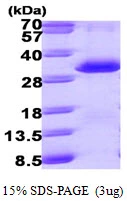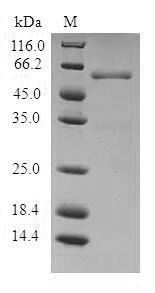
3μg Human PSME1 protein (GTX67703-pro) by SDS-PAGE under reducing condition and visualized by coomassie blue stain.
Human PSME1 protein, His tag
GTX67703-PRO
Protein IDQ06323
Product group Proteins / Signaling Molecules
Overview
- SupplierGeneTex
- Product NameHuman PSME1 protein, His tag
- Delivery Days Customer9
- CertificationResearch Use Only
- Concentration0.5 mg/ml
- ConjugateUnconjugated
- Gene ID5720
- Target namePSME1
- Target descriptionproteasome activator subunit 1
- Target synonymsHEL-S-129m, IFI5111, PA28A, PA28alpha, REGalpha, proteasome activator complex subunit 1, 11S regulator complex subunit alpha, 29-kD MCP activator subunit, IGUP I-5111, activator of multicatalytic protease subunit 1, epididymis secretory sperm binding protein Li 129m, interferon gamma up-regulated I-5111 protein, interferon-gamma IEF SSP 5111, interferon-gamma-inducible protein 5111, proteasome (prosome, macropain) activator subunit 1 (PA28 alpha)
- Protein IDQ06323
- Protein NameProteasome activator complex subunit 1
- Scientific DescriptionThe 26S proteasome is a multicatalytic proteinase complex with a highly ordered structure composed of 2 complexes, a 20S core and a 19S regulator. The 20S core is composed of 4 rings of 28 non-identical subunits; 2 rings are composed of 7 alpha subunits and 2 rings are composed of 7 beta subunits. The 19S regulator is composed of a base, which contains 6 ATPase subunits and 2 non-ATPase subunits, and a lid, which contains up to 10 non-ATPase subunits. Proteasomes are distributed throughout eukaryotic cells at a high concentration and cleave peptides in an ATP/ubiquitin-dependent process in a non-lysosomal pathway. An essential function of a modified proteasome, the immunoproteasome, is the processing of class I MHC peptides. The immunoproteasome contains an alternate regulator, referred to as the 11S regulator or PA28, that replaces the 19S regulator. Three subunits (alpha, beta and gamma) of the 11S regulator have been identified. This gene encodes the alpha subunit of the 11S regulator, one of the two 11S subunits that is induced by gamma-interferon. Three alpha and three beta subunits combine to form a heterohexameric ring. Alternative splicing results in multiple transcript variants. [provided by RefSeq, Jul 2013]
- Storage Instruction-20°C or -80°C,2°C to 8°C
- UNSPSC41116100
- SpeciesHuman



